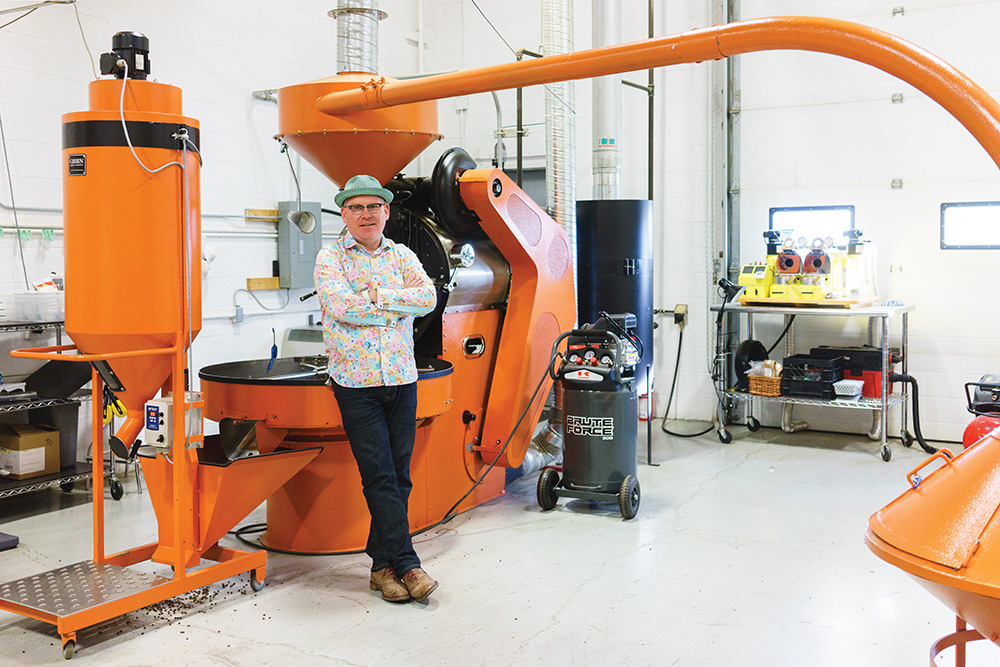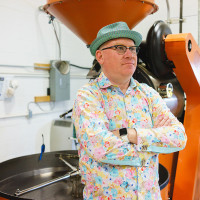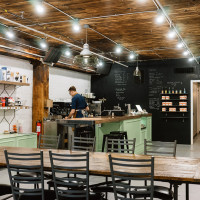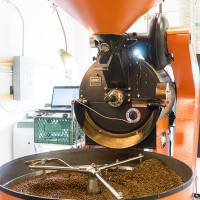Edmonton’s roasters are brewing up something strong
Lisa Catterall

Edmonton’s coffee scene may have begun with chic cafes such as Leva, Da Capo, and Credo, but quickly became more as Edmontonians began reaching for something more refined than a double-double. As this evolution of taste has occurred, the number of coffee roasters in the city has grown to match.
“It’s only specialty coffee that’s growing, all across North America and Europe.” says Poul Mark, founder/CEO of Transcend Coffee and Roastery. “Better-quality coffee is more desirable, and people want to know where coffee comes from. People want traceability and transparency.”
Mark started Transcend in 2006 and has witnessed the growth of the city’s café culture.
 |
 |
 |
 |
“We’ve always been of the view that the more independents there are, the more exposure the market gets to something that isn’t Starbucks or Tim Hortons,” says Mark. “We see this growth as a good thing.”
Coffee roasting in the city is not new. For over 30 years, Java Jive provided Edmontonians with freshly roasted beans from its base in Old Strathcona. The European-style roasts were particularly influential at the University of Alberta, where Java Jive’s two cafes supported the caffeine addictions of generations of students. Though Java Jive closed in 2013, it remains a legacy in the city, with many roasters viewing it as an influential force that helped birth the local coffee movement.
Following in the footsteps of Java Jive, Iconoclast Coffee began operations in 2008, working out of an industrial space on 118 Avenue. Since that time, more entrepreneurs have followed suit. Catfish Coffee and Café Tiramisu have been operating for a number of years while ACE Coffee Roasters began distributing in the spring of 2015 and Rogue Wave Coffee opened its doors in summer 2015.
Like Transcend, and many of the city’s current roasters, Rogue Wave seeks to make a deeper connection between consumers and their coffee.
“Every roast is very important, every bag of beans is very important, and where the beans come from is important,” says David Laville, co-founder of Rogue Wave Coffee, “We use specialty coffee importers who work directly with farmers and cooperatives and we also source beans directly from small farms.”
Though the approach each roaster takes may differ, one thing is clear. Edmonton’s thirst for coffee is unquenchable.
“Edmonton’s coffee scene is changing,” says Ryan Arcand, owner of Iconoclast Coffee. “It’s no surprise, really. Roasting is a nice thing to do. It’s a beautiful thing. It’s artisanal, it’s qualitative, and like all things culinary, you can look as deeply into the product as you want.”
Each of the city’s roasters specialize in different products and offer a wide variety of complementary options for aficionados.
Transcend focuses on the origin character of the beans used, lightly roasting its beans and working closely with coffee farmers to highlight the complex flavour notes that are a result of climate, soil content and processing. Rogue Wave takes a similar approach, selecting each batch of beans individually.
“We roast small amounts of coffee. We’re looking for something that really wows us and something we think will work
in certain applications, especially pour overs,” says David Walsh, co-founder.
Laville and Walsh order small amounts of beans, sampling as many as 30 varieties each month before deciding which will make it to the shelves. Their first love is the pour over—so each varietal is roasted to accentuate the delicate flavours and prepare them for this use.
ACE Coffee Roasters, on the other hand, specializes in darker roasts for both coffee and espresso.
“Right now, we’re focusing on an Italian- style roast,” says Daniel Lodewyk, roaster at ACE, “but it’s very much about the pursuit of quality, not of a certain style.”
“As roasters, the one thing that we could do more of is highlight what the others are doing. We’re all doing different things, and we want people to explore that a bit more,” says Laville.
Laville and Walsh currently use two roasters at Rogue Wave—one small Huky roaster for preparing their sample beans, and a larger Coffee-Tech roaster for larger batches. Using the Coffee- Tech, they are able to prepare enough for their own café and retail use, but have found that they are quickly reaching their maximum capacity. In order to meet demands for more beans, the pair have ordered an additional roaster, and are currently awaiting its arrival.
Edmonton has welcomed the increased number of roasters and cafes in recent years. Movements promoting local consumption, such as cash mobs and “shop local” events, have supported independent cafes and roasters, yet there seems to be a disconnect between local roasters and many smaller, independent cafes. Instead of serving locally roasted beans, many cafes have opted for high- quality artisan brands like Four Barrel from San Francisco, Bows and Arrows from Victoria, and Phil & Sebastian from Calgary.
Coffee Bureau, one of Edmonton’s latest caffeine merchants, made the decision early on to source their beans from a local roaster rather than looking farther afield. For owners Cristiane Tassinari and Peter West the choice was simple. They have worked closely with Edmonton coffee expert Joe Parrottino of Leva and Caffe Tech as he began building the ACE brand. With decades of experience in the coffee industry, Parrottino was motivated to launch ACE Coffee Roasters when West was preparing to launch Coffee Bureau.
“We finally felt like we were ready to start roasting,” Parrottino says, “and we were looking forward to working with Peter again.”
“We had both worked with Joe in the past. It was almost a no-brainer when we were talking about opening up a coffee shop and deciding on where to get beans,” says Tassinari. “It’s great to have that connection to our roaster. We can talk to him about the roasts; if anything happens, he is right here for us.”
Parrottino and Lodewyk are industry veterans who are dedicated to building ACE into a household name. The two use a 24-kilogram Diedrich roaster to prepare fresh beans several times a month.
This connection between consumers, roasters and farmers demonstrates coffee’s ability to bond and connect individuals, ideally with Edmonton’s independent roasters being supported more by local independent cafes and retailers.
“There’s definitely room in the market for more cafes, especially those that are focusing on local roasters,” says Mark.
“Coffee and the café scene are vibrant; they’re interesting. It makes sense that more and more people will try and develop a business,” says Arcand.
Right now, the scene is percolating, we’ll see where it goes from here.
Lisa Catterall is an Edmonton-based freelance writer who is often far too caffeinated for her own good.